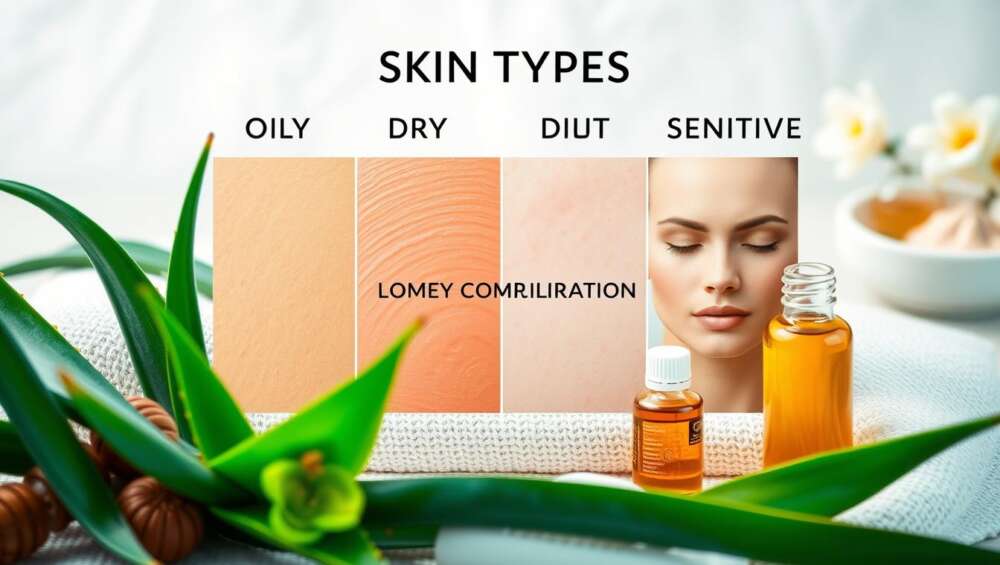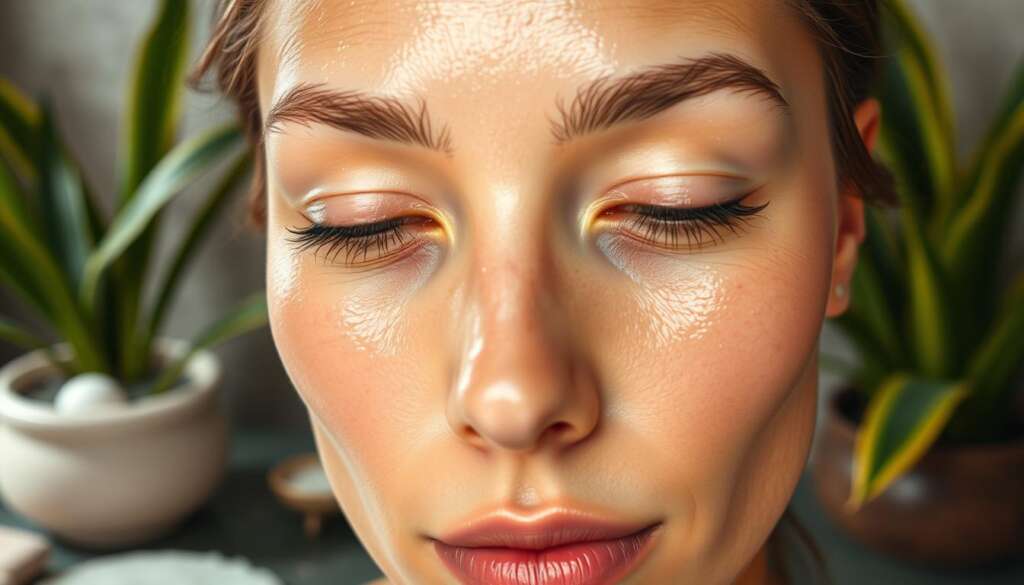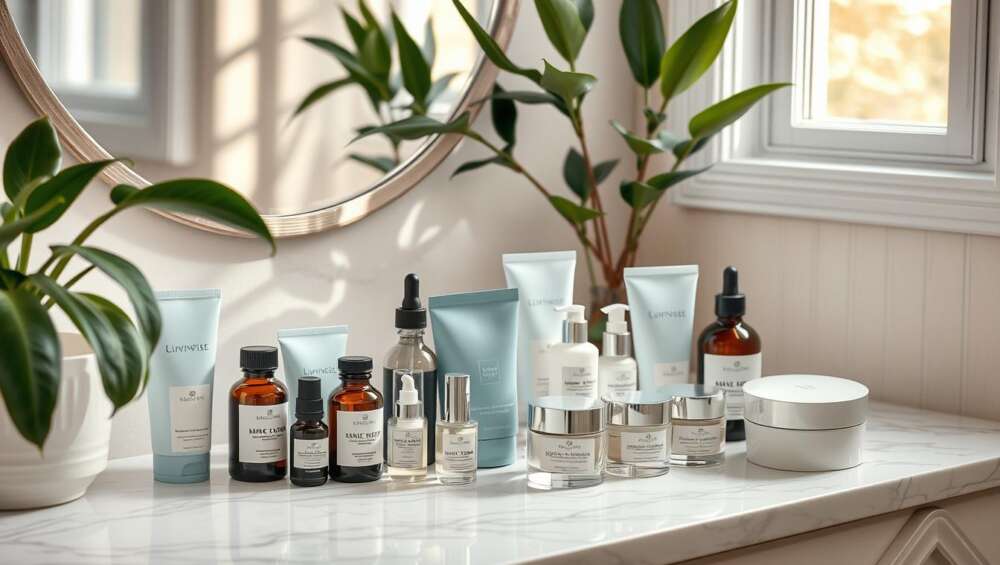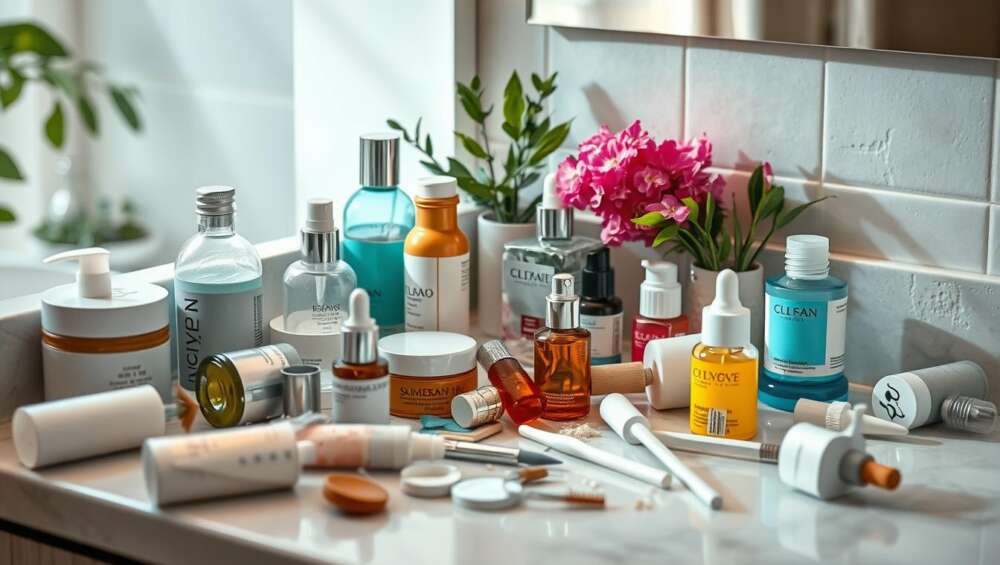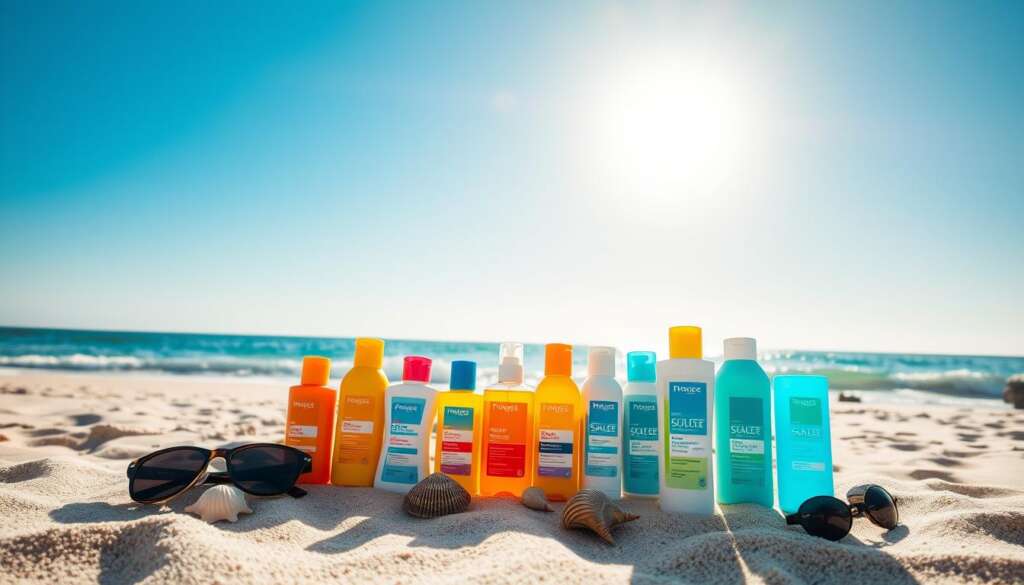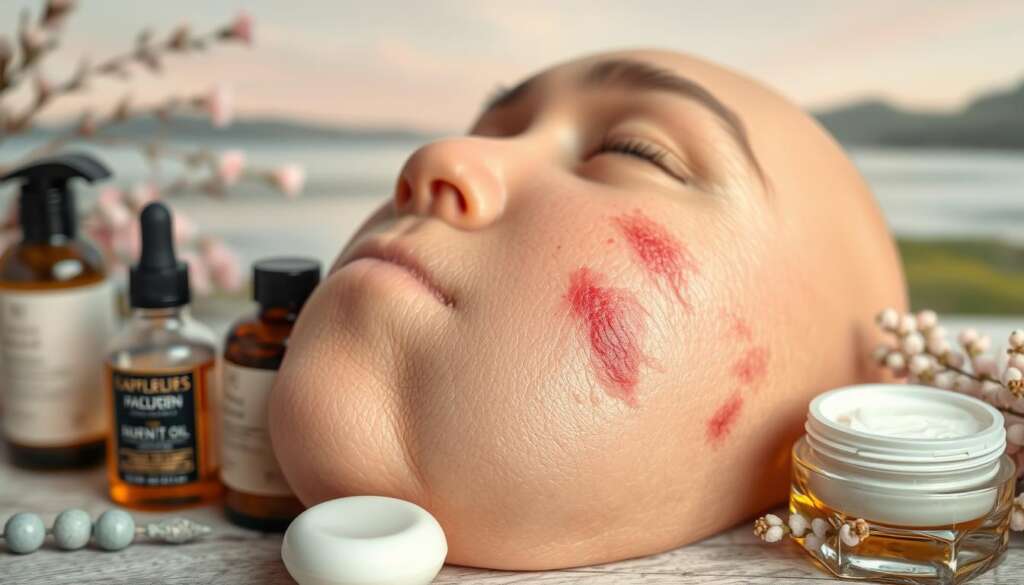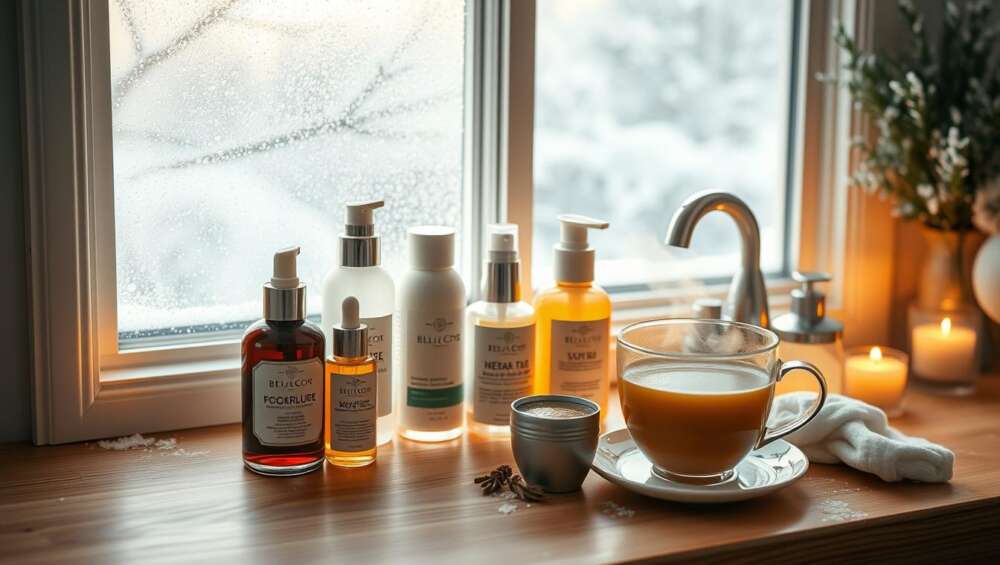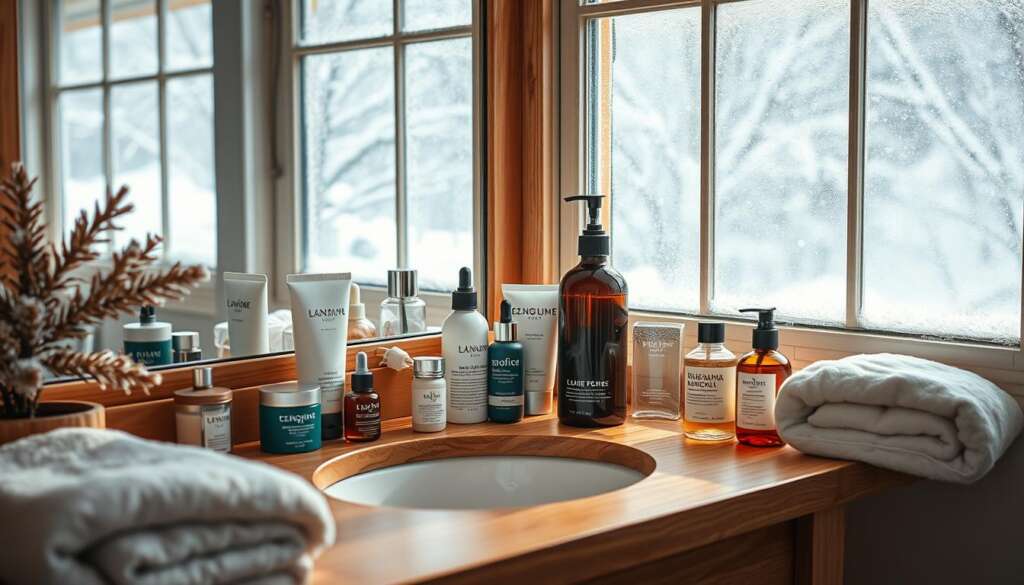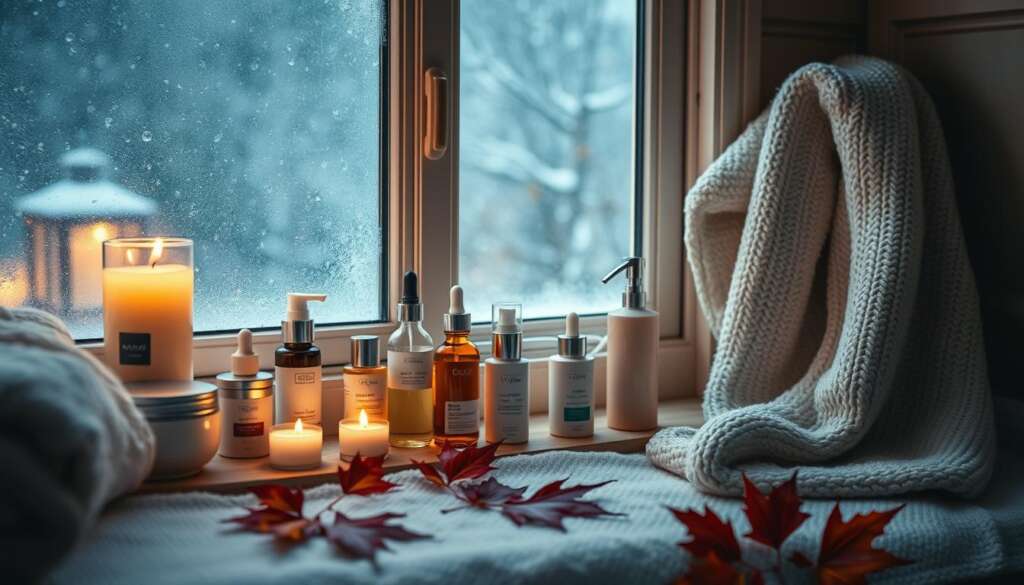When we look in the mirror, we often wish for that perfect glow. But, what if nature held the key to glowing skin? In this article, we’ll discover the top natural ingredients for a radiant look. They’ll help you feel confident and radiant in your own skin.
Many of us search for glowing skin, facing challenges along the way. Whether it’s oily skin or dry patches, the journey seems tough. But, with the right natural ingredients, achieving your dream skin is possible.
Nourishing jojoba oil and vitamin C are just a few of the natural wonders for your skin. Together, they hydrate, nourish, and brighten your complexion. You’ll end up with a radiant glow that shows off your inner beauty.
Welcome Your Skin’s Natural Glow
Discover the power of natural ingredients for a glowing complexion. At Elizabeth O Beauty, we use nature’s restorative powers to nourish your skin. Our products blend natural oils and botanical extracts for visible results.
Power of Natural Ingredients
Niacinamide and licorice extract brighten your skin, reducing acne scars and dark spots. Our Snow White Glow Oil is lightweight and absorbs quickly. It leaves your skin soft and smooth.
Hydrate and Nourish Your Skin
Drinking at least 8 glasses of water a day keeps your skin hydrated and radiant. Adding moisturizers like coconut oil and rose water boosts your skin’s glow.
Enhance Your Skin’s Radiance
- Antioxidants like vitamins C and E protect your skin from damage, promoting healing and glow.
- Green tea extract reduces redness and swelling, fighting free radical damage.
- Exercise boosts blood circulation, delivering nutrients and oxygen for a radiant glow.
Unlock your skin’s natural beauty with Elizabeth O Beauty’s skincare. Say goodbye to dullness and hello to a glowing complexion.

How Elizabeth O Beauty Differs From Other Beauty Brands
At Elizabeth O Beauty, we focus on making natural beauty products that care for your skin. We choose the best ingredients and use the latest research to make sure our products work. This sets us apart from many other brands.
Our products feel great on your skin and are made with special blends. You’ll find everything from face oils to soaps that brighten your skin. We aim to make your beauty routine a time to relax and glow.
We don’t just care about making money; we value honesty and doing the right thing. Our products are cruelty-free and made from natural, eco-friendly ingredients. This means they’re good for you and the planet.
Our prices range from $19.99 to $240.00, so everyone can find something they like. Many of our best sellers are just $59.99. This price is perfect for those looking for quality without breaking the bank.
Choosing Elizabeth O Beauty means you’re getting products that will make your skin happy. Our customers love our products, giving us many 5-star reviews. They say our natural beauty solutions really work.
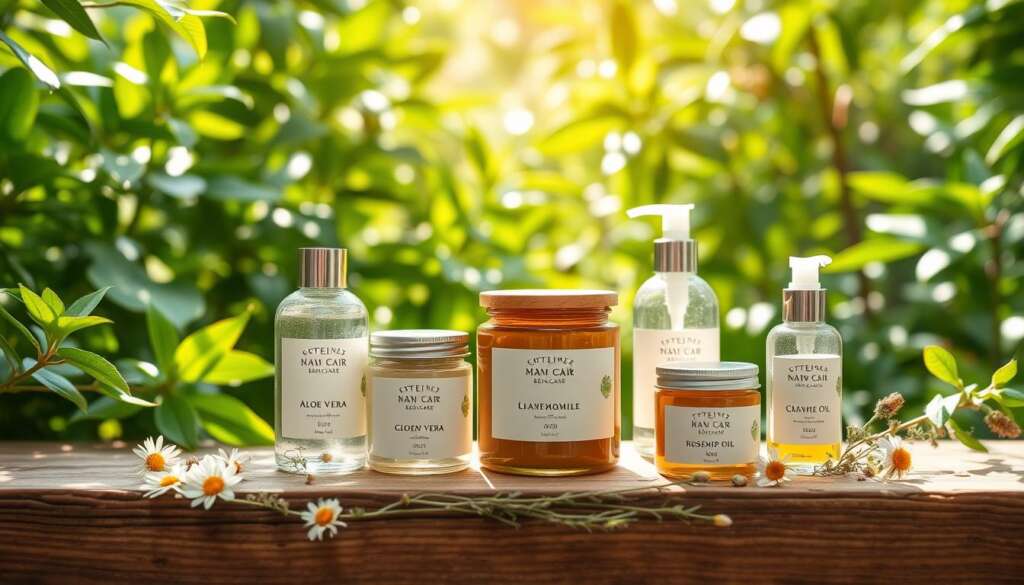
We offer a wide range of products, from face oils to soaps. No matter what you need for your skin, we have it. Our products can help with everything from dryness to uneven skin tone.
Elizabeth O Beauty is all about using top-notch natural ingredients and delivering amazing results. We combine science with a love for natural wellness. This makes our products stand out from the rest.
The Best Natural Ingredients for Glowing Skin
Many people want to look radiant and healthy. The secret is using nature’s best ingredients. These include nourishing oils and powerful antioxidants that can make your skin glow.
Jojoba Oil
Jojoba oil is great for your skin. It makes it soft, smooth, and supple. It’s like your skin’s natural oil, so it helps balance oil and prevent breakouts.
Vitamin C
Vitamin C is a strong antioxidant. It brightens your skin and reduces dark spots. It fights free radicals and boosts collagen, making your skin look even and bright.
Niacinamide
Niacinamide, or Vitamin B3, is amazing for your skin. It reduces fine lines and wrinkles and makes pores smaller. It also improves your skin’s texture and tone, giving you a youthful glow.
These natural ingredients together give you glowing skin. They’re key to any natural skincare routine. Adding them to your daily care can make your skin look healthy and radiant.
The Importance of Consistency
Consistency is key for glowing, radiant skin. A regular natural skincare routine keeps your skin balanced. It helps with dryness, dehydration, or breakouts.
Visible results in skincare take time and dedication. Like with weight loss, consistent skincare efforts lead to long-term benefits. A few minutes each day can improve your skin health.
Creating a consistent skincare habit is crucial. It turns into a daily ritual that improves your skin. To stay consistent, set reminders, create self-care routines, and try new products.
Gentle Exfoliation: The Key to Radiance
Getting a radiant, glowing skin starts with exfoliation. Exfoliation removes dull, dead skin cells. But, it’s key to find the right balance to avoid irritation and dryness.
Physical vs. Chemical Exfoliants
Physical and chemical exfoliants have their benefits. Physical ones, like scrubs or brushes, remove dead skin cells. Chemical exfoliants use acids or enzymes to break down skin cells.
For a gentle yet effective method, choose chemical exfoliants with alpha-hydroxy acids (AHAs). Glycolic acid or lactic acid are good choices.
Recommended Exfoliating Products
The L’Oréal Paris RevitaLift Derm Intensives line is great for gentle exfoliation. The Glycolic Acid Cleanser and Glycolic Acid Serum are excellent. They gently remove dead skin cells without drying or irritating.
The U Beauty Resurfacing Compound and the RéVive Enzyme Essence Daily Resurfacing Treatment are also good. They combine AHAs, vitamins, and nourishing ingredients for radiant skin.
Start slowly with exfoliation, 2-3 times a week. Always hydrate and protect your skin from the sun after exfoliating.
Hydration: The Foundation of Glowing Skin
Getting a radiant glow starts with staying hydrated. Moisturizing your skin fights off dullness and dryness. It makes your skin look tired and dull. To get that natural glow, add hydrating products to your skincare routine.
Our top pick is the L’Oréal Paris RevitaLift Derm Intensives Micro Hyaluronic Acid + Ceramides Line-Plumping Water Cream. It’s a lightweight moisturizer that hydrates deeply. Your skin will feel plump and fresh without feeling greasy.
To boost your skin’s moisture, layer the L’Oréal Paris RevitaLift Derm Intensives Micro Hyaluronic Acid + Ceramides Line-Plumping Water Cream with a hyaluronic acid serum. Try the L’Oréal Paris RevitaLift Derm Intensives 1.5% Pure Hyaluronic Acid Serum. This combo gives your skin an extra moisture boost, making it glow.
Hydration is key for glowing skin. By using these hydrating products, you’ll get the glowing skin you want. Your skin will radiate confidence and health.
The Power of Retinol for Rejuvenation
Looking for a natural skincare routine to get that glowing skin? Retinol is a key ingredient. It comes from vitamin A and is known for its skin-rejuvenating powers. It can really change how your skin looks.
Retinol boosts cell turnover and collagen production. It also makes your skin texture better. Regular use can make fine lines and wrinkles less visible. It also fades dark spots and clears pores for smoother skin.
As we get older, our skin makes less collagen. This leads to less elasticity and firmness. Retinol helps keep your skin looking young by boosting collagen. It also prevents dead skin cells and oil buildup, reducing breakouts.
Start with a low concentration of retinol and gradually increase. Apply it at night because your skin is more sensitive to sunlight. Using a moisturizer with retinol can prevent dryness or irritation.
Looking for a natural retinol option? Bakuchiol, a plant-based compound, is a good alternative. It offers similar benefits without harsh side effects. Brands like OGEE and KYPRIS have natural retinol products for a gentle glow.
At-Home Peels for Deeper Exfoliation
Many of us dream of glowing, radiant skin. At-home peels can make this dream a reality. These treatments are more powerful than regular scrubs and cleansers. They help reveal the healthy, youthful skin beneath.
At-home peels, or exfoliating acid masks, break down dead skin cells. They also boost collagen and elastin for smoother skin. You can choose from alpha-hydroxy acids (AHAs), beta-hydroxy acids (BHAs), or fruit enzymes. These options target various skin issues, like dullness, discoloration, clogged pores, and fine lines.
The L’Oréal Paris Bright Reveal Dark Spot Exfoliant Peel is a great choice. It combines different acids to reduce dark spots and enhance skin brightness. Regular use can lead to a more even, radiant complexion.
Consistency is crucial when using at-home peels. Use them once or twice a week. Then, apply hydrating and nourishing products to help your skin recover and glow. With natural ingredients and patience, you’ll get the glowing skin you desire.
Brightening with Vitamin C
Vitamin C is a key player in getting a radiant glow. It’s an antioxidant that brightens the skin and reduces discolorations. It also makes the skin look youthful and luminous.
The L’Oréal Paris RevitaLift 12% Pure Vitamin C + E + Salicylic Acid Serum is a top choice. It boosts skin radiance and smooths out texture. It also evens out skin tone over time, thanks to its 12% pure Vitamin C.
Vitamin C serums vary in price, from $20 to $115 for 1 oz. Some have up to 15% Vitamin C, while others, like CeraVe, have 12%. True Botanicals offers a Vitamin C booster in powder form for $56 per 1 oz.
Adding a Vitamin C serum to your skincare routine can change your skin’s look. The right formula will help you achieve brighter, more radiant skin.
Sun Protection: The Unsung Hero
Getting a glowing complexion is more than just a good skincare routine. Sun protection is key. Sun exposure can lead to fine lines, wrinkles, sun spots, and dull skin. To achieve the radiant skin we want, sunscreen is essential.
Best Sunscreen for Glowing Skin
The L’Oréal Paris Bright Reveal Broad Spectrum SPF 50 Daily UV Lotion is a top pick. It’s lightweight and non-greasy. It protects our skin from UV rays and brightens our skin tone for a healthy glow.
Up to 90% of visible aging comes from sun exposure. Using this broad-spectrum sunscreen daily is vital. Apply it at least 30 minutes before going outside and reapply every two hours, especially if you’re swimming or sweating.
Even on cloudy days, up to 80% of the sun’s UV rays can get through. So, using sunscreen all the time is crucial. By focusing on sun protection, we keep our skin healthy and glowing, moving closer to our goal of radiant skin.
Addressing Discoloration with Dark Spot Serums
If you have dark spots or uneven skin tone, a dark spot serum can help. These treatments aim to fade hyperpigmentation caused by sun, acne, or hormones. They make your skin look bright and even.
Hyperpigmentation makes some skin areas darker because of too much melanin. This can lead to dark spots or patches in various colors. Sun exposure is a big reason for this, so using sunscreen with SPF 50 is crucial.
Dark spot serums use strong ingredients like hydroquinone, retinoids, and glycolic acid. These help reduce discoloration and make your skin look even and bright. Products like SkinMedica’s Even & Correct Advanced Brightening Treatment and La Roche-Posay’s Mela B3 Dark Spot Serum are known to work well.
To see results, use a dark spot serum regularly. It might take weeks or months to see the full effect. Also, don’t forget to exfoliate gently, stay hydrated, and protect your skin from the sun.
While dark spot serums from the store can help, stronger treatments might be needed for severe cases. Talk to a dermatologist to find the right treatment for your skin.
Adding a dark spot serum to your skincare routine is a big step towards glowing skin. With patience and regular use, these products can reduce dark spots and show off your natural beauty.
Conclusion
Getting radiant, glowing skin is a journey. It needs a holistic approach. Focus on using the best natural ingredients for glowing skin.
By sticking to a natural skincare routine, you can get a luminous, healthy look. This is the key to a glowing complexion.
In this article, we talked about the power of natural ingredients. We mentioned jojoba oil, vitamin C, and niacinamide. We also highlighted the importance of gentle exfoliation, hydration, and sun protection.
By focusing on these areas and staying true to your skincare routine, you can achieve a glowing complexion. This will make you feel confident and beautiful.
The path to glowing skin is unique for everyone. Make your routine fit your specific skin needs. Let your natural glow shine through.
With the right natural skincare strategies, you’ll get your most radiant, healthy-looking skin. You’re on your way to unveiling your best skin yet.
FAQ
What are the best natural ingredients for glowing skin?
For glowing skin, use jojoba oil, vitamin C, and niacinamide. They nourish, brighten, and enhance skin radiance.
How important is consistency in achieving a glowing complexion?
Consistency is crucial for glowing skin. A regular skincare routine keeps your skin balanced. It prevents dryness, dehydration, and breakouts.
What is the difference between physical and chemical exfoliants, and which is better for gentle exfoliation?
Physical and chemical exfoliants have their benefits. For gentle exfoliation, choose chemical exfoliants with alpha-hydroxy acids (AHAs). They remove dead skin cells without drying out your skin.
How does hydration contribute to a glowing complexion?
Hydration is key for a glowing complexion. Moisturizing fights dullness, dry patches, and dehydration. It makes your skin look fresh and vibrant.
What are the benefits of using retinol for skin rejuvenation?
Retinol reduces fine lines, improves texture, and brightens dull skin. Regular use can also reduce dark spots and unevenness, leading to glowing skin.
How can at-home peels help achieve a radiant complexion?
At-home peels offer deeper exfoliation and rejuvenation than regular exfoliants. They remove dead skin cells, unclog pores, and improve skin concerns like dark spots.
What are the benefits of using vitamin C for a glowing complexion?
Vitamin C brightens the skin, improves discolorations, and supports a radiant complexion. It’s a powerful ally for glowing skin.
Why is sun protection important for maintaining a glowing complexion?
Sun exposure causes fine lines, wrinkles, sun spots, and dullness. Sunscreen protects your skin from UV rays. It brightens and evens out your skin tone for a glowing complexion.
How can dark spot serums help improve the appearance of discoloration for a glowing complexion?
Dark spot serums fade stubborn dark spots and improve skin brightness. They help achieve an even, radiant complexion.


